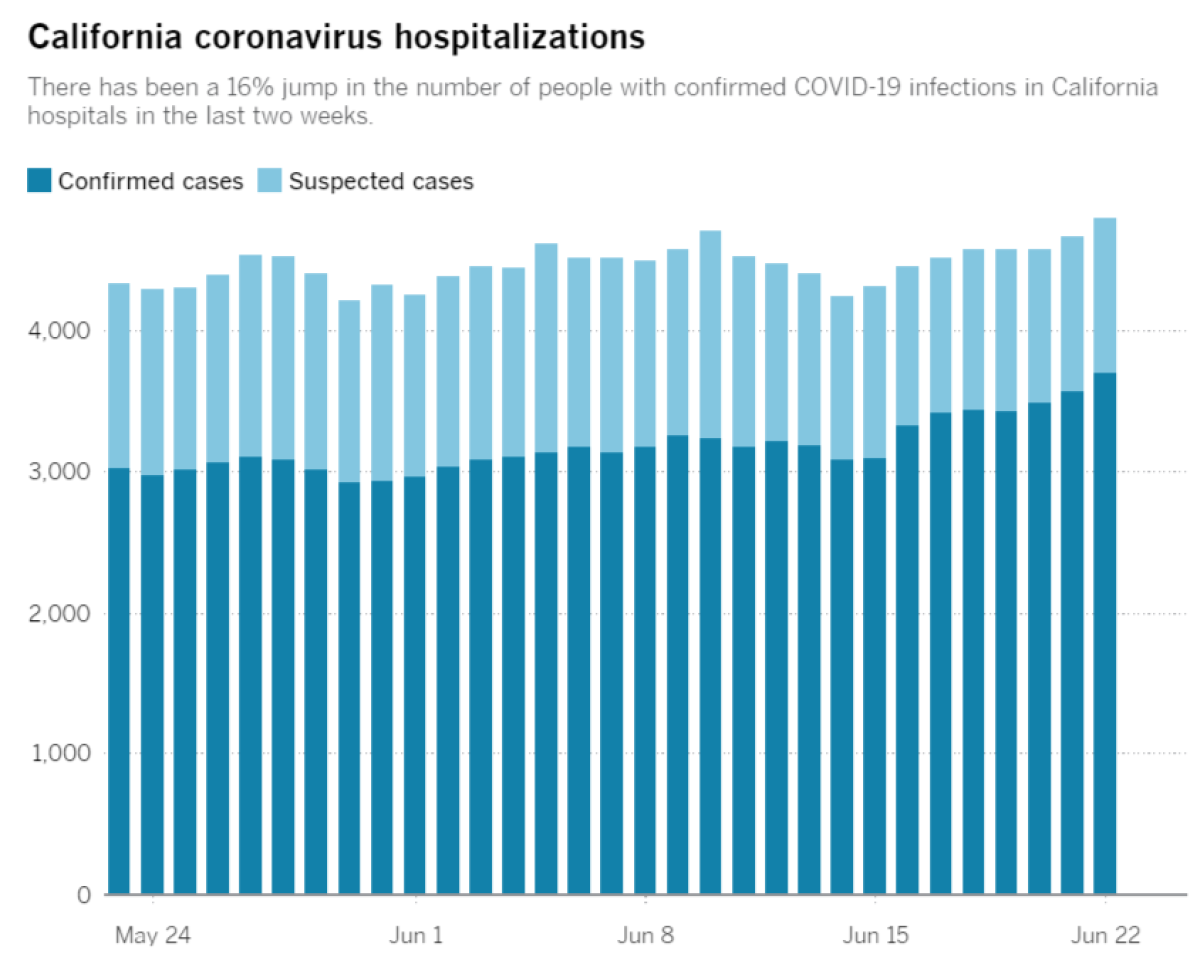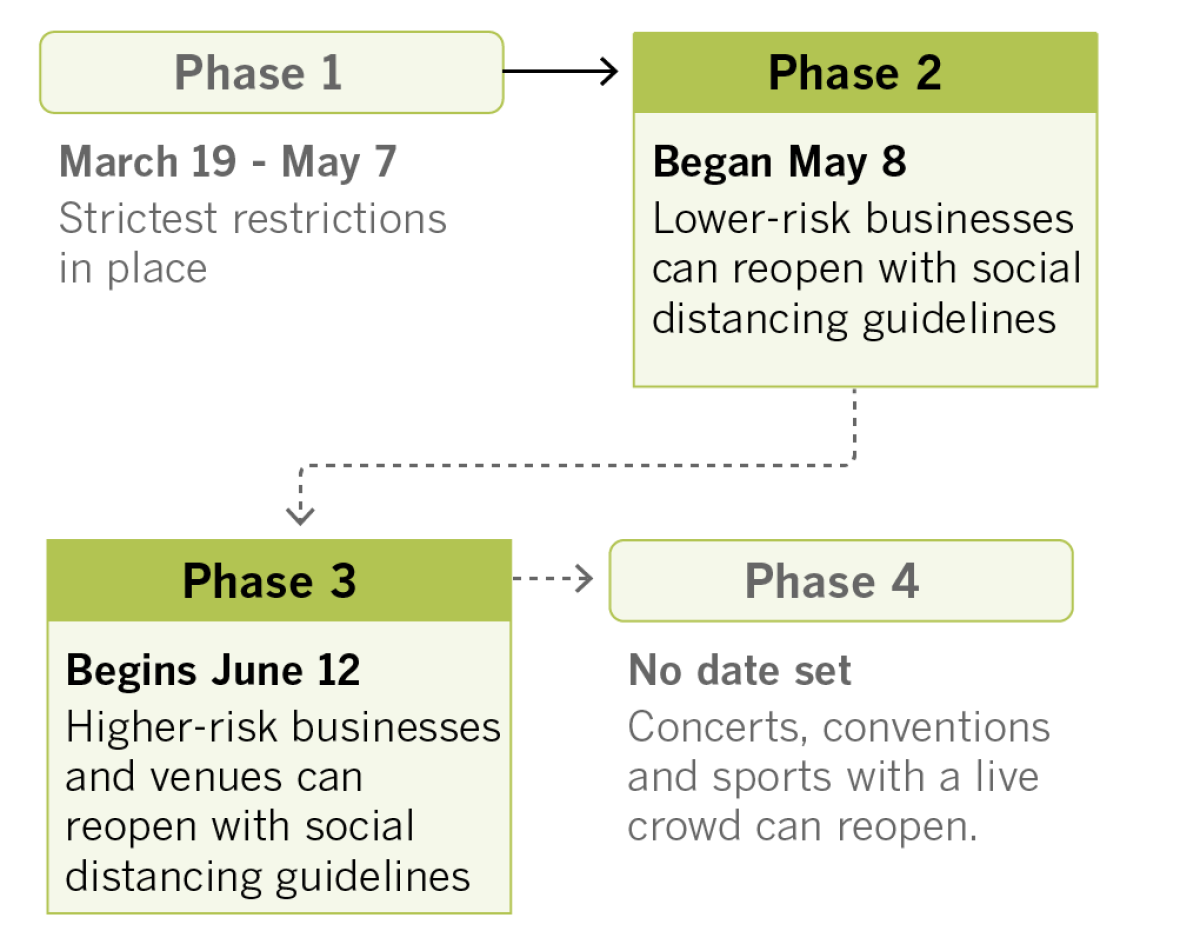Coronavirus Today: Are we reopening too quickly?
Good evening. Iâm Diya Chacko, and itâs Tuesday, June 23. Hereâs whatâs happening with the coronavirus in California and beyond.
Despite the growing number of infections across the country, the Trump administration has been considering scaling back the national emergency declared earlier this year, according to healthcare industry officials who have spoken with the administration. The emergency declaration loosened or waived regulations on hospitals and other medical providers to help them deal with the COVID-19 pandemic and helped route badly needed money to states. Doctors and public health leaders were alarmed at the prospect of ending it, which they say could make it harder to keep the outbreak in check.
California shattered records when it logged more than 6,000 new coronavirus infections Monday, the largest single-day count in the state since the pandemic hit the U.S. Increased testing capacity may partially account for the high number of new cases, but health officials have said thatâs not the sole reason for the sharp rise. Of greater concern is the growing number of hospitalizations.

That is raising questions about whether the reopening process is moving too fast. Officials had said they expected cases to rise as businesses reopened and activity resumed. Now, however, theyâre tying the increase in hospitalizations to the resurgence of social gatherings as well as the lack of universal mask-wearing. L.A. County Public Health Director Barbara Ferrer said that while it is impossible to track the origin of spread in a public setting, it is âhighly likelyâ that the overall increase is related to protests as well as gatherings at restaurants and private parties.
Gov. Gavin Newsom said he felt confident the state would be able to cope with the outbreak in the weeks and months ahead as it works to alleviate the economic impact of the shutdown. However, he also said the state might have to reverse course on reopening if case counts keep climbing. âWe are prepared to do that, if we must,â he said.
By the numbers
California cases and deaths as of 4:45 p.m. PDT Tuesday:

Track the latest numbers and how they break down in California with our graphics.

See which counties are reopening with our tracker.
Consider subscribing to the Los Angeles Times
Your support helps us deliver the news that matters most. Become a subscriber.
Across California
Coronavirus infections among Los Angeles police officers spiked in recent weeks, reflecting a broader increase in cases regionally and igniting debate about the possible role of mass protests against police violence. Police officials said officers were exposed during protests as they worked to disperse crowds, while protesters say officers arrested people en masse while not wearing masks, exposing not just themselves but others.
The L.A. City Council on Tuesday passed a $100-million rent relief program that would provide up to $2,000 in rental assistance for low-income households who can prove they have lost work, fallen ill or had to assist sick family members during the pandemic. Tenants must make no more than 80% of the median income in the area â a limit of $83,500 for a family of four â to be eligible, and half the funding will be reserved for those making no more than 30% of the area median income, or $31,300 for a family of four.
Businesses in Vernon have been plagued by coronavirus outbreaks, with the largest at the Smithfield Foods-owned Farmer John pork-processing plant. On Tuesday, the L.A. County Board of Supervisors asked local health officials to do more to protect employees who work in Vernon, many of whom live in nearby working-class, heavily Latino communities that are already disproportionately affected by COVID-19.
An outbreak at the Santa Anita racetrack has landed it on the county public health departmentâs list of nonresidential settings with five or more confirmed cases of COVID-19. The agency said that 17 people have tested positive at the track, which opened for live racing on May 15 after being closed for around two months under pandemic orders.
While the coronavirus has canceled some events at the Rose Bowl, the Pasadena venue will host new ones this summer: drive-in movies. The âTribeca Drive-Inâ series will bring a slate of movie screenings and stand-up comedy performances to the Pasadena landmark on select days through July. You can view the full schedule and buy tickets here.
Resources
â For general safety, wash your hands for at least 20 seconds (hereâs a super-fun how-to video). Stop touching your face, and keep your phone clean. Practice social distancing, maintaining a six-foot radius of personal space in public. And wear a mask if you leave home. Hereâs how to do it right.
â Watch for symptoms including fever, cough, shortness of breath, chills, repeated shaking with chills, muscle pain, headache, sore throat and loss of taste or smell. If youâre worried you might be infected, call your doctor or urgent care clinic before going there.
â Need a COVID-19 test? Hereâs how to receive a free test if youâre in L.A. County. And hereâs a map of testing sites across California.
â Hereâs how to care for someone with COVID-19, from monitoring their symptoms to preventing the virusâ spread.
â If your job has been affected by the coronavirus pandemic, hereâs how to file for unemployment.
â Here are some free resources for restaurant workers and entertainment industry professionals having trouble making ends meet.
â Advice for helping kids navigate pandemic life includes being honest about uncertainties, acknowledging their feelings and sticking to a routine. Hereâs guidance from the CDC.
â In need of mental health services? Here are resources for coping during the crisis from the CDC and the L.A. County Department of Public Health. L.A. County residents can also call (800) 854-7771 or text âLAâ to 741741.
â Tempted to go out now that the economy is reopening? Hereâs how you can assess your risk.
Around the nation and the world
Daily new COVID-19 cases have risen in 23 states this month, according to data from Johns Hopkins University. Those states include Texas, California, Florida and Arizona, where Trump is expected this week. Texas has reported 3,500 new cases and more than 3,200 hospitalizations each day for the past week â record highs for the pandemic, said Gov. Greg Abbott, who was quick to start reopening businesses last month. âCOVID-19 is now spreading at an unacceptable rate in Texas, and it must be corralled,â he said.
Trump has complained that ramped-up testing is inflating the number of reported cases and leading to comparisons with other nations that he considers unfair. On Tuesday, he repeated a claim he made Saturday at a Tulsa, Okla., campaign rally that he had directed his administration to curb its testing â but Dr. Anthony Fauci and other top government officials said they hadnât received any such order. âTo my knowledge, none of us have ever been told to slow down on testing,â Fauci said in testimony before the House Energy and Commerce Committee. âThat is just a fact.â
Disneyland Paris is the latest site in the Disney empire to reopen after shutting down in March. Like other Disney venues, there will be new safety protocols in place: Attendance will be limited to allow for social distancing, visitors 11 and older must wear face coverings, and advance ticket purchases and reservations will be required through a new online system. FastPass wonât be offered, allowing the park to manage lines.
Your questions answered
Todayâs question comes from readers who want to know: Our economic stimulus money has not yet arrived. What can we do? Hereâs what Times personal finance columnist Liz Weston has to say.
The Internal Revenue Service is calling people back to work, but employees are confronting an almost incomprehensible backlog of paperwork and requests for help. Millions of paper returns are sitting in trailers, waiting to be entered into the IRSâ computers, and no one has been available to process electronic returns that were flagged because of problems.
The IRS has reopened the general taxpayer helpline that was shuttered because of the coronavirus pandemic, and it has added thousands of phone reps to a special hotline to deal with stimulus payment problems. At a minimum, you should be able to file a tax return next year to get your stimulus payment as a refundable credit. If you need the money now, though, you should follow up with the IRS at (800) 919-9835.
You can also check the status of a refund through the âWhereâs My Refundâ tool on the IRS site or by calling (800) 829-1954.
Got a question? Our reporters covering the coronavirus outbreak want to hear from you. Email us your questions, and weâll do our best to answer them. You can find more answers in our Frequently Asked Questions roundup and on our coronavirus roundup page.
For the most up-to-date coronavirus coverage from The Times, visit our homepage and our Health section, listen to our âCoronavirus in Californiaâ podcast and follow us on Twitter and on Instagram.




